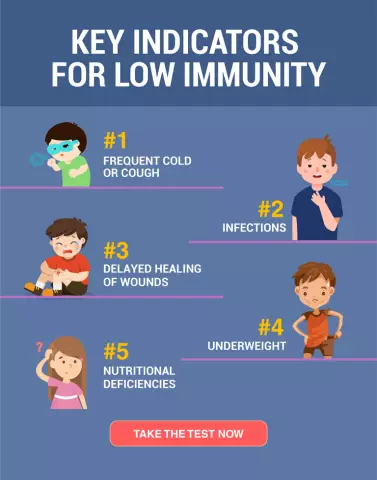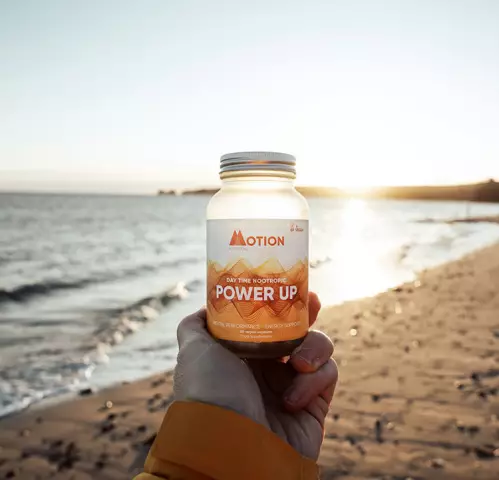- Author Rachel Wainwright wainwright@abchealthonline.com.
- Public 2023-12-15 07:39.
- Last modified 2025-11-02 20:14.
How to increase the immunity of a child?
The role of immunity in a child's life is invaluable. Proteins-immunoglobulins, produced by the immune system, protect against diseases that can become a stress factor for an organism that has not yet matured and cause many complications, even a delay in the development of a baby. If the immune system is weakened, then health is under direct threat, and active actions are needed to strengthen the body's defenses - preferably non-drug.

Source: depositphotos.com
Signs of a weakened immune system
The state of immunodeficiency, which develops gradually, is accompanied by characteristic signs that any observant parent can distinguish. These include:
- increased fatigue, frequent headaches, pallor, blue circles under the eyes;
- dull, split hair, brittle nails;
- sleep disturbances (insomnia or drowsiness);
- frequent colds and viral diseases (more than 5 times a year). At the same time, during the illness, the child rarely has a fever;
- painless enlargement of the cervical and axillary lymph nodes;
- dysbiosis (violation of the stool, bloating);
- decreased appetite, body weight;
- food allergies.
If one or more of the listed symptoms is found in a child, it is recommended to consult a pediatrician: perhaps these are signs of a dangerous illness (for example, blood diseases). If the diagnosis is determined, the immune system should be helped with the means approved by the doctor.
Methods for increasing general immunity
The state of the immune system is complex and depends on many factors, "building blocks". It is not enough just to temper the child, not providing the body with all the necessary substances, or only to fully feed, neglecting physical activity. In strengthening the immune system are especially important:
- balanced diet. Together with food, the child should receive the amount of vitamins and minerals appropriate for his age. The diet requires fresh fruits, vegetables, juices, fish, dairy products;
- compliance with the daily routine. It is recommended to be in bed for a child already at 21.00. Both too early and late awakenings are not recommended. The optimal time for waking up in the morning is 7.00-8.00. Daytime sleep is shown to preschool children;
- elimination of foci of chronic infection (timely treatment of carious teeth, sinusitis, tonsillitis, etc.);
- prevention and treatment of helminthic invasions;
- elimination of dysbiosis. It is known that the intestine contains a tangible part of the immune system - about a million immunocompetent lymphoid organisms, which do not perform their functions in a state of imbalance in the intestinal environment.
An effective means of strengthening the immune system is considered to be hardening - dousing with cold water, wiping with a towel, contrast shower, walking barefoot, visiting the pool. Pediatricians do not recommend starting hardening "on the fresh tracks" of the disease, as well as in the cold season - for the development of immunity, at least 2 months of regular procedures are required. Hardening actions should be attended to until the period of autumn-winter colds: in spring or summer, starting with pouring water at room temperature, light gymnastics, walking barefoot on warm sand.
Immunomodulators
Immunomodulating drugs can strengthen the immune system after a serious illness and surgery. These include:
- interferons ("Viferon", "Kipferon"), which protect against viral infections;
- stimulants for the production of natural interferons in the body (Anaferon, Arbidol, Cycloferon);
- bacterial agents made from neutralized infectious agents (Likopid, Riomunil, IRS-19);
- herbal preparations ("Immunal", "Bioaron S").
Any immunomodulator is a "heavy artillery" that should be used only in cases where vitamin therapy, hardening, physical activity and other methods of increasing general immunity have not yielded results. Taking immunomodulators is allowed only on the recommendation of a doctor; frequent or uncontrolled use of stimulants can cause the opposite effect - depletion of the immune system. In addition, such drugs should not be given to children under the age of 1.5 years.
Folk remedies and recommendations
Some immunomodulatory drugs are based on extracts from medicinal herbs, berries, fruits and other gifts of nature. Some of them can be eaten without restrictions (these are vegetables, buckwheat, peas, garlic, wheat germ, walnuts), but most are better taken with therapeutic courses (decoctions of nettle, chamomile, rose hips, lemon balm, St. John's wort, hawthorn, echinacea).
The most effective remedy for enhancing immunity is a decoction of oat grains, they are recommended to water the child in the warm season for a month. Reception of the drug can cause some loosening of the stool, so the dose of the decoction should be adjusted depending on the child's individual reaction to drinking.

Source: depositphotos.com
Experienced doctors recommend using the following recipe to strengthen the immune system: chop lemon, walnuts and raisins in equal parts, mix with honey and give the child 2 teaspoons 3 times a day. Just regular use of honey (in the absence of allergic reactions), as well as parsley leaves will help to strengthen the body: just 1 teaspoon of chopped fresh plant will provide the child with a daily supply of most of the vitamins and minerals he needs.
The immune system is finally formed by the period of puberty, and until that moment the child's body is still weak and needs to be strengthened. However, to start procedures (especially when practicing hardening, taking immunomodulators and medicinal herbs), in order to avoid harm, you should be careful, be sure to coordinate your actions with a pediatrician.
YouTube video related to the article:

Maria Kulkes Medical journalist About the author
Education: First Moscow State Medical University named after I. M. Sechenov, specialty "General Medicine".
Found a mistake in the text? Select it and press Ctrl + Enter.






